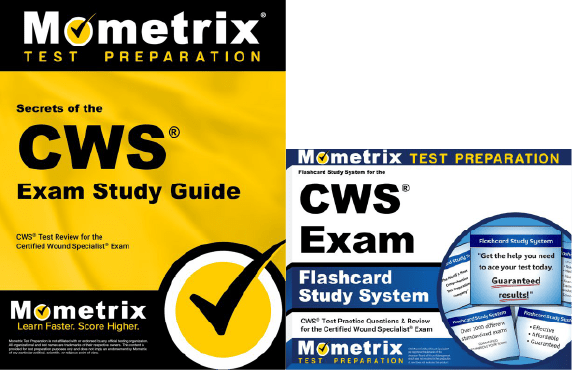If you need help studying for the Certified Wound Specialist® (CWS®) exam or just want some more information about what the test is like, you’ve come to the right place.
Click below for free CWS exam practice questions!
Exam Eligibility
Before you can register to take the CWS exam, you’ll need to have at least three years of clinical wound care experience and one of the following licenses:
- DO
- DPM
- MD
- NP
- DVM
- PA
- PT
- OT
- PharmD
- RD
- RN
If you meet these requirements, you’re set to begin the registration process!
What’s on the Exam?
First, let’s talk about the questions on the exam. There are 150 multiple-choice questions total, but only 125 of the questions will count toward your score. Why is that?
The 25 unscored questions on the exam are called “pretest” questions. These are added to the exam to determine if they’re good enough questions to add to future versions of the test.
The trick is that you won’t have any way of knowing which questions are scored and which ones are pretest. They will appear just like the scored questions throughout the test.
The time limit for the exam is 3 hours. There aren’t any scheduled breaks, but you’re free to take restroom breaks as needed.
Let’s take a closer look at the different sections of the CWS exam.
1. Wound Healing Environment
23 scored questions
There are two subareas in this section:
- Integumentary
- Musculoskeletal
- Vascular
- Neurological
- Lymphatic
- Other systems
- Phases
- Cell function
- Acute vs. chronic
2. Assessment and Diagnosis
34 scored questions
- History
- Physical examination
- Wound and skin assessment
- Pain assessment
- Risk assessment
- Functional assessment
- Laboratory/Imaging/Biopsy
- Nutrition
3. Patient Management
30 scored questions
- Wound bed preparation/debridement
- Dressings
- Cellular and/or tissue products for wounds
- Topical agents
- Complications in healing
- Nutrition
- Biophysical technologies
- Compression therapy
- Negative pressure wound therapy
- Hyperbaric oxygen therapy
- Pressure redistribution
- Surgical closure or tissue transfer
- Case review
- Ostomy
4. Etiological Considerations
26 scored questions
- Neuropathy
- Diabetes
- Venous insufficiency
- Ischemia
- Pressure related wounds
- Lymphedema
- Trauma
- Surgical/surgical procedure
- Atypical etiologies
- Dermatological
- Infectious
- Burns
- Edema
- Pediatric issues
- Inflammatory
5. Professional Issues
12 scored questions
- Documentation/legal concepts
- Patient adherence
- Reimbursement and medical economics
- Medical ethics
- Multidisciplinary teams
- Epidemiology
- Evidence-based practice and research
How to Register
Once you’ve ensured that you meet all of the eligibility requirements, you can register for the exam.
To get started, you’ll need to submit an application on ABWM’s website. The application will ask you for your contact information and any documentation to prove your eligibility (among other things).
Exam Scores
The exam is scored using two methods: the modified Angoff method and the bookmark standard setting method.
Modified Angoff Method
This method relies on a group of subject matter experts to evaluate each question on the exam and determine its overall difficulty. Once a rating is agreed upon for each question, they establish a cut score, which indicates how many questions you need to answer correctly to be at the minimum level of competency.
Online CWS Test Prep Course
If you want to be fully prepared, Mometrix offers an online CWS prep course. The course is designed to provide you with any and every resource you might want while studying. The CWS course includes:
The CWS prep course is designed to help any learner get everything they need to prepare for their CWS exam. Click below to check it out!
Retaking the Exam
If you didn’t get a passing score on your first try, that’s okay! You can retake the test after a 30-day waiting period.
Keep in mind that you will have to pay a retesting fee of $150 every time you retake the test.
FAQs
How many questions are on the CWS exam?
The exam contains 150 questions.
What is the time limit for the CWS exam?
The exam is timed at 3 hours.
How much does the CWS exam cost?
The testing fee is $575.
How hard is the CWS exam?
It’s considered to be pretty difficult, with a passing rate of only 60%.
CWS® and Certified Wound Specialist® are registered trademarks of the American Board of Wound Management, which was not involved in the production of, and does not endorse, this page.



 CWS Online Course
CWS Online Course CWS Study Guide
CWS Study Guide CWS Flashcards
CWS Flashcards

